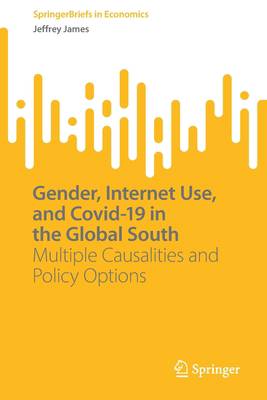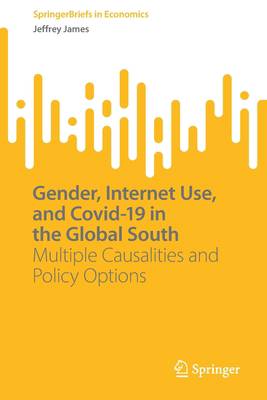
- Retrait gratuit dans votre magasin Club
- 7.000.000 titres dans notre catalogue
- Payer en toute sécurité
- Toujours un magasin près de chez vous
- Retrait gratuit dans votre magasin Club
- 7.000.0000 titres dans notre catalogue
- Payer en toute sécurité
- Toujours un magasin près de chez vous
Gender, Internet Use, and Covid-19 in the Global South
Multiple Causalities and Policy Options
Jeffrey James
47,45 €
+ 94 points
Description
This book analyzes the use of the mobile Internet against the background of gender bias and Covid-19, currently two of the most important and pressing problems of the Global South. The book argues that the degree of benefits from this new technology depends heavily on the way it is actually used and that most new technologies are developed for the conditions prevailing in rich countries, where they tend to be quite easily adopted and used. In the Global South, by contrast, a paucity of digital skills and other factors make the potentially valuable benefits from the Internet much more difficult to derive.
Using empirical data recently provided by the Groupe Speciale Mobile Association (GSMA), the book examines the existence and extent of the digital divide between males and females in mobile Internet use, which constitutes a new form of divide. It sheds light on the acute difficulty for first-time mobile Internet users in the Global South, and especially Sub-Saharan Africa, to learn the digital skills that are needed to use the said technology effectively, with a special focus on how these users acquire the required knowledge, without having undergone the process of learning by doing. The book further discusses the determinants of digital skills in the Global South, as well as major factors underlying the extent to which different users actually benefit from the mobile Internet, such as gender, location, age, and education. Finally, it investigates how womens' use of the Internet has been altered by the pandemic in the Global South.
This book will appeal to students, researchers, and scholars of development economics and development studies, as well as policy-makers interested in a better understanding of the impact of gender bias and Covid-19 on mobile internet use in the Global South.
Using empirical data recently provided by the Groupe Speciale Mobile Association (GSMA), the book examines the existence and extent of the digital divide between males and females in mobile Internet use, which constitutes a new form of divide. It sheds light on the acute difficulty for first-time mobile Internet users in the Global South, and especially Sub-Saharan Africa, to learn the digital skills that are needed to use the said technology effectively, with a special focus on how these users acquire the required knowledge, without having undergone the process of learning by doing. The book further discusses the determinants of digital skills in the Global South, as well as major factors underlying the extent to which different users actually benefit from the mobile Internet, such as gender, location, age, and education. Finally, it investigates how womens' use of the Internet has been altered by the pandemic in the Global South.
This book will appeal to students, researchers, and scholars of development economics and development studies, as well as policy-makers interested in a better understanding of the impact of gender bias and Covid-19 on mobile internet use in the Global South.
Spécifications
Parties prenantes
- Auteur(s) :
- Editeur:
Contenu
- Nombre de pages :
- 62
- Langue:
- Anglais
- Collection :
Caractéristiques
- EAN:
- 9783031155758
- Date de parution :
- 01-10-22
- Format:
- Livre broché
- Format numérique:
- Trade paperback (VS)
- Dimensions :
- 156 mm x 234 mm
- Poids :
- 113 g

Les avis
Nous publions uniquement les avis qui respectent les conditions requises. Consultez nos conditions pour les avis.






